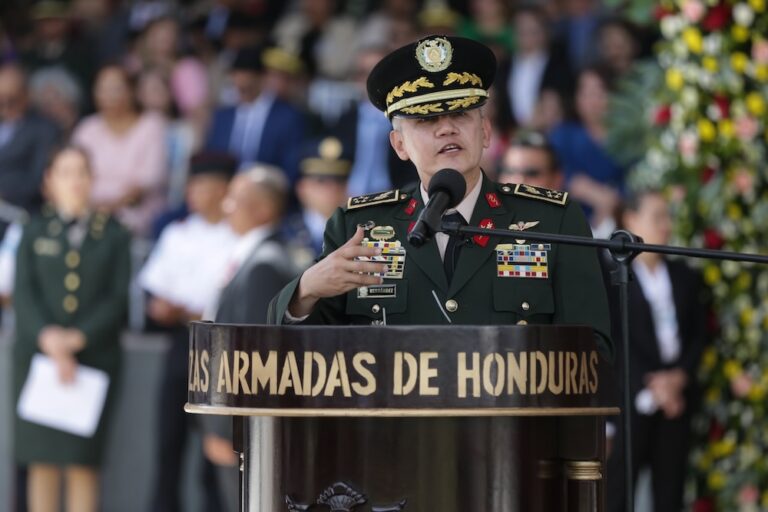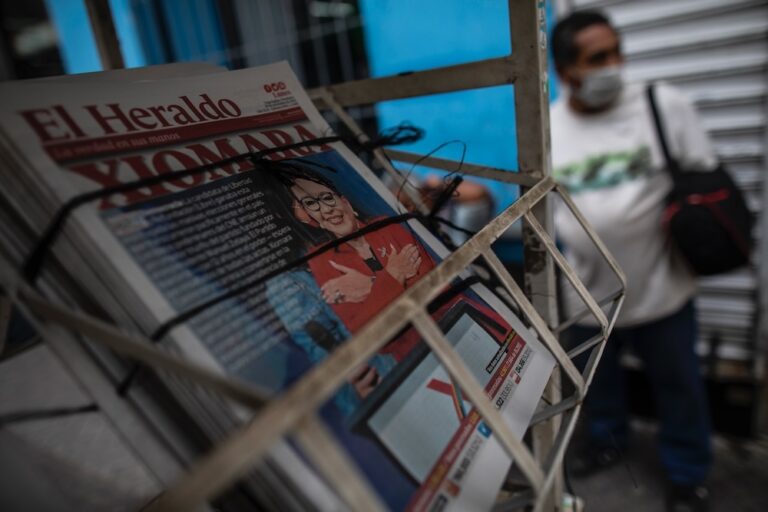"Honduras has become one of the most dangerous places in the world for local journalists and community radio stations, with at least 9 reporters killed in 9 months," say the mission members.
(AMARC/ARTICLE 19/IFEX) – 9 September 2010 – Almost nine months after President Porfirio Lobo took office, Honduras has made little substantial progress toward investigating on-going killings, attacks and threats against journalists, said an international press freedom investigative mission to the country.
“Investigations are littered with mistakes and inconsistencies that, coupled with on-going threats and attacks against journalists, have fostered a climate of fear in this Central American country”, said the mission members. “Honduras has become one of the most dangerous places in the world for local journalists and community radios with at least 9 reporters killed in 9 months.”
From 24 August to 2 September, in response to these continued violations of press freedom and freedom of expression in Honduras, three international media support and freedom of expression organizations – ARTICLE 19, the legal programme of the World Association of Community Radios – Latin America and the Caribbean (AMARC-ALC) and International Media Support (IMS) – carried out a joint investigative mission into the killings of journalists and attacks against the media, visiting the cities of Tegucigalpa, Tocoa, Zacate Grande and the Garifuna community of Triunfo de la Cruz.
The mission focused primarily on the two specific cases involving the 14 March killing of Channel 5 reporter, Nahúm Palacios, who was killed in Tocoa, as well as the 6 January incendiary attack on community radio station Faluma Bimetu (Coco Dulce). Meanwhile, threats to Radio Progreso, occupied by the military during the coup, have continued and, in a strange turn of events, a judge acquitted the military stating that the decree that ordered the closure of media outlets would have, in any case, taken Radio Progreso off the air.
In all these cases “precautionary measures” had been granted by the Inter-American Commission on Human Rights (IACHR), ordering the Honduran state to protect the media outlets or personnel in question.
“The Government accepts little to no responsibility for the cases, the local police have failed to protect the journalists and the judicial police ignore key protocols in the early stages of the investigations,” the Commission found. “In the end, it’s the same inaction of the authorities that has allowed these and other attacks to be perpetrated.”
The Commission also investigated the case of community radio the Voice of Zacate Grande, on the southwest coast of Honduras, which aired for the first time in April.
Agroindustrial tycoon Miguel Facussé Barjum accused the station’s representatives of occupying “his” land and of “tax fraud.”. On 3 June 2010, a contingent of soldiers and police officers closed down the station, which now faces a legal battle to get back on the air. On 22 August, there was a clash between members of the community allegedly sent by Facussé, in which three people were injured. Police present at the scene did nothing to prevent the attacks.
After its May 2010 mission to Honduras, the IACHR concluded that these killings and threats had not been adequately investigated. It also called on the Honduran state to have “investigations conducted by independent, specialized bodies with a view to ascertaining the facts surrounding these deaths, which includes determining whether in fact the crimes were related to the practice of the profession, so that the persons responsible for the crimes can be tried and convicted.”
The Police declared that all cases were properly investigated and that none of them is related to the practice of the profession. Yet the Commission’s findings show otherwise.
While President Lobo has expressed regret over the killings of journalists, his words have not translated into actions. A warrant has been issued for the arrest of four individuals accused of being the perpetrators and instigators of radio journalist David Meza Montesinos’ murder on 11 March in the Atlantic coast town of Ceiba, but there have been no developments in the murder of his colleague, Nahum Palacios Arteaga, who was gunned down three days later following threats believed to have come from the army.
“The authorities have not shown any progress in the investigations into the other killings or threats and there have been no other detentions or prosecutions,” said the mission.
On 1 September, the Honduran Congress held a press conference with local media to release a report into the killings of journalists and the progress made by the police and judicial authorities in their investigations into these assassinations. However, the report, while the first of its kind in Honduras, does little to dispel fears of political collusion in a series of botched investigations.
“Instead of issuing reports that confirm the ineffectiveness of the police in investigating crimes against journalists, the Honduran Congress would do better to focus on redirecting the impending debates around the national budget and the need to provide substantive financial backing to the key members of the inter-institutional human rights committee dealing with investigations into the killings of journalists and human rights defenders,” said the mission. “On 15 September, the national budget will begin to be discussed and without serious financial backing the key security and judicial forces trying to investigate these crimes will continue to be left impotent.”
The Congress should also prioritize the need to reform the Telecommunications Act and recognize community media on equal terms with the traditional outlets, thereby guaranteeing pluralism and diversity in the media.
Mission members met with a broad variety of independent journalists, families of the journalists, human rights lawyers and activists, as well as with the EU delegations in El Pueblo Garifuna, Zacate Grande, Tocoa and Tegucigalpa.
In October, the mission will present its final investigative report to the IACHR at its upcoming hearing in Washington D.C. It will then be up to the IACHR to decide if the Honduran state is adequately investigating the attacks against community radios and local media and the killings of journalists in the country.


